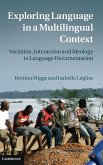Based on real-life case studies, this book provides an empirical study of the linguistic accessibility of environmental information for people from diverse language, cultural, and educational backgrounds. It deploys well-established statistical and machine learning models to evaluate the key linguistic features of environmental information dissemination, to both English and non-English-speaking readers, on topics such as environmental health risk and natural disaster preparedness. Using Japanese, Swahili, Tigrinya, Zulu, and Somali languages as illustrations, this book shows how English-speaking professionals can significantly improve the cross-lingual translatability of community-oriented environmental information by using machine learning. It can be used as a latest research reference for readers from different disciplinary backgrounds interested in how to design linguistically accessible environmental information to increase its social and community impact. It can also be used as a practical guidebook to community-oriented environmental information design.
Bitte wählen Sie Ihr Anliegen aus.
Rechnungen
Retourenschein anfordern
Bestellstatus
Storno








